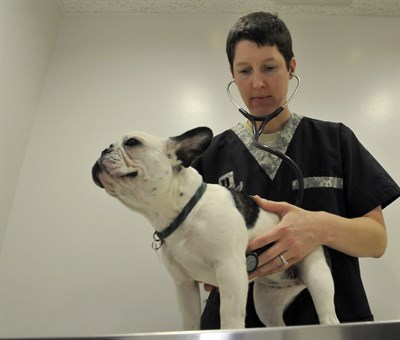Cardiac Problems in Pets
Heart disease is the leading cause of death for both men and women, worldwide. Pet owners should also be concerned for the hearts of their beloved animal friends. The heart is a complex organ, and it is important to be aware of the heart diseases a pet can develop and to know what to look for so that your pet can have the best possible care.

“Dogs and cats can be born with cardiac problems or develop them later in life” said Dr. Ashley Saunders, assistant professor at the Texas A&M College of Veterinary Medicine & Biomedical Sciences. “Some of the acquired cardiac diseases in animals are similar to cardiac disease in people and include leaky heart valves or a weak heart muscle resulting in heart failure. Dogs and cats can both develop high blood pressure. Even if your dog or cat was not born with heart problems, it is important to have them checked regularly by a veterinarian for heart disease.”
Signs of heart disease in pets can include cough, increased breathing rate, breathing difficulty, fainting or decreased activity level. A heart murmur or irregular heart rhythm might be found during an examination. Diagnostic testing, frequently using a combination of xrays, heart ultrasound, electrocardiogram and blood pressure, is required to diagnose the underlying heart disease and select the most appropriate therapy. Treatment for heart failure includes a combination of medications and lifestyle changes related to diet and activity level. Some of the heart diseases diagnosed in puppies can be treated with minimally invasive procedures that use small incisions and catheters to fix problems in the heart.
“At Texas A&M we can perform minimally invasive procedures to fix specific heart problems; but ultimately the treatment that is used is dependent on the type of cardiac problem your pet has” said Saunders.
“Heartworm disease is a common problem in dogs and cats that is transmitted by mosquitoes” said Saunders. “It is one of the only heart related conditions that can be prevented with a monthly pill or topical liquid placed on the neck that absorbs into the skin.”
Treatment is possible but is more costly than monthly prevention. Dogs can be tested for heartworm disease annually.
Specific breeds that are more prone to cardiac problems than others include Doberman Pinschers, boxers, Cavalier King Charles spaniels and Maine coon cats. If you are the owner of one of these breeds, be sure to check them in to your veterinarian for appropriate health screening recommendations.
Heart diseases cannot always be prevented, but most can be detected by being aware of what to look for and having your pet regularly evaluated by your veterinarian.
Pet Talk is a service of the College of Veterinary Medicine & Biomedical Sciences, Texas A&M University. Stories can be viewed on the Web at vetmed.tamu.edu/news/pet-talk. Suggestions for future topics may be directed to editor@cvm.tamu.edu.
Angela G. Clendenin
Director, Communications & Public Relations
Ofc – (979) 862-2675
Cell – (979) 739-5718


